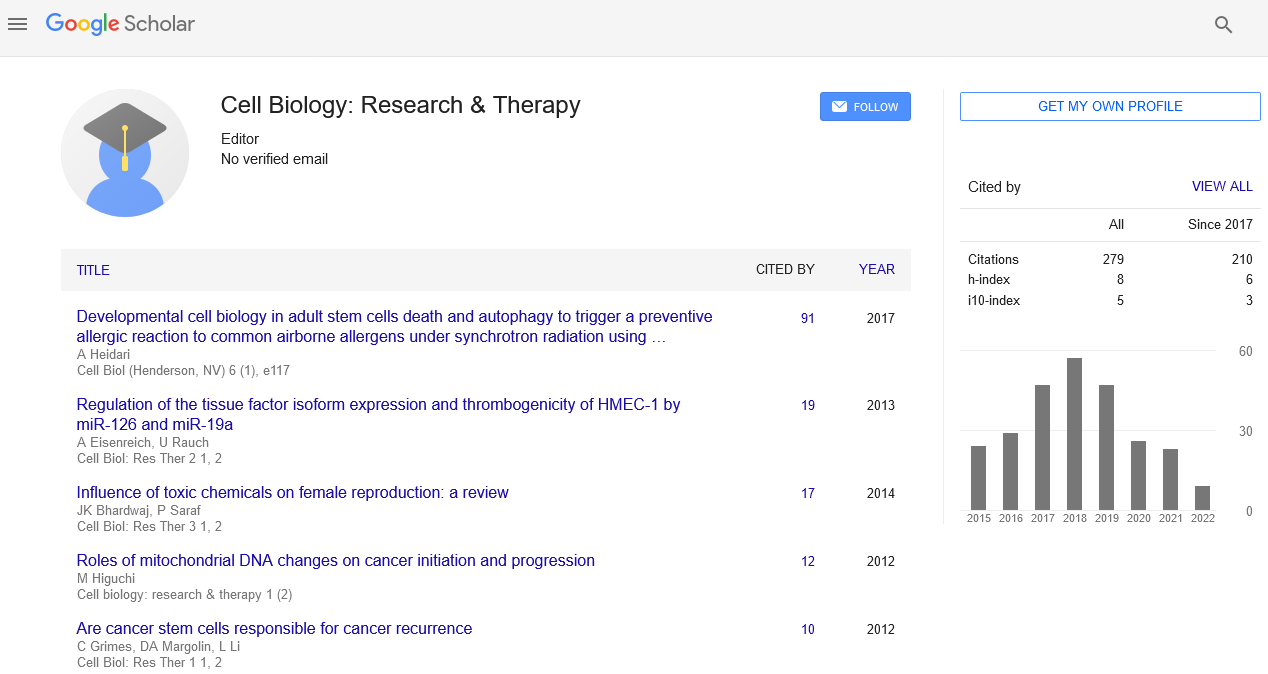Perspective, Cell Biol Vol: 12 Issue: 1
Stem Cell Therapy and the Science of Cell Differentiation
Tyson Nichole*
1Department of Cell Biology and Anatomy, New York Medical College, Valhalla, NY, USA
*Corresponding Author:Tyson Nichole
Department of Cell Biology and Anatomy,
New York Medical College, Valhalla, NY, USA;
E-mail: nicholet@valhalla.edu
Received date: 21 February, 2023, Manuscript No. CBRT-23-95184;
Editor assigned date: 23 February, 2023, Pre QC No. CBRT-23-95184(PQ);
Reviewed date: 07 March, 2023, QC No. CBRT-23-95184;
Revised date: 14 March, 2023, Manuscript No. CBRT-23-95184(R);
Published date: 24 March, 2023, DOI: 10.4172/2324-9293.1000172
Citation: Nichole T (2023) Stem Cell Therapy and the Science of Cell Differentiation. Cell Biol 2023 12:1.
Description
Stem cell therapy is a stimulating part of regenerative medicine that has the potential to revolutionize the treatment of various diseases and injuries. Stem cells are undifferentiated cells that have the ability to differentiate into specialized cell types in the body. They can selfrenew and regenerate, making them a capable source for repairing damaged tissues and organs.
The science of cell differentiation plays an important role in stem cell therapy. Cell differentiation is the process by which an unspecialized cell becomes specialized, taking on a specific function within the body. In order for stem cell therapy to be effective, it is essential to understand the mechanisms of cell differentiation and to control the differentiation of stem cells into the desired cell types.
There are two main types of stem cells that are used in stem cell therapy: embryonic stem cells and adult stem cells. Embryonic stem cells are derived from embryos and have the ability to differentiate into any cell type in the body. Adult stem cells, on the other hand, are found in various tissues and organs throughout the body and have a more limited ability to differentiate.
One of the key challenges in stem cell therapy is directing the differentiation of stem cells into the desired cell types. This is accomplished through the use of various growth factors, signaling molecules, and other molecular cues that can influence cell differentiation. Researchers are also exploring the use of gene editing and other techniques to control the differentiation of stem cells.
Stem cell therapy has capacity promise in the treatment of a variety of diseases and injuries. One example is the use of hematopoietic stem cell transplantation to treat leukemia and other blood disorders. In this procedure, stem cells are taken from a donor or the patient and transplanted into the patient's bone marrow, where they can differentiate into healthy blood cells.
Stem cell therapy is also being investigated as a potential treatment for spinal cord injuries, heart disease, and other conditions. In the case of spinal cord injuries, stem cells could be used to regenerate damaged nerve tissue and restore function. In heart disease, stem cells could be used to regenerate damaged heart tissue and improve cardiac function.
Despite its potential , there are still many challenges to be overcome in stem cell therapy. One major challenge is the risk of rejection, as the immune system may recognize transplanted stem cells as foreign and attack them. Researchers are exploring various strategies to overcome this challenge, such as using immunosuppressive drugs or producing stem cells that are less likely to be recognized by the immune system.
Another challenge is the potential for stem cells to form tumors or other abnormal growths. Researchers are working to understand the mechanisms that lead to abnormal growth and to develop strategies to minimize this risk.
Conclusion
In conclusion, stem cell therapy has the potential to revolutionize the field of regenerative medicine, offering new treatments for a variety of diseases and injuries. The science of cell differentiation is critical to the success of stem cell therapy, as it allows researchers to direct the differentiation of stem cells into the desired cell types. Despite the many challenges that remain, the promise of stem cell therapy makes it an exciting and rapidly evolving field of research. As scientists continue to advance our understanding of stem cells and the mechanisms of cell differentiation, it is likely that stem cell therapy will play an increasingly important role in the treatment of human disease and injury.
 Spanish
Spanish  Chinese
Chinese  Russian
Russian  German
German  French
French  Japanese
Japanese  Portuguese
Portuguese  Hindi
Hindi 